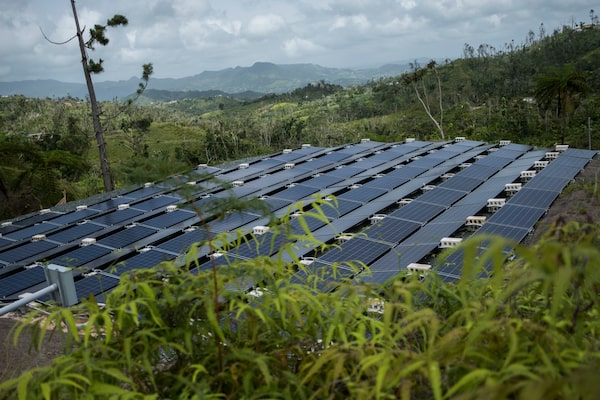
Solar panels installed by Tesla, power a community of 12 homes in the mountain town of Las Piedras, Puerto Rico, on July 20, 2018.Dennis M. Rivera Pichardo/The Associated Press
Investing based on climate risks and opportunities is finally attracting considerable attention - and large capital flows. There are so many options that it is challenging for investors to choose. The level of activity is not likely to help “solve” climate. Climate investing will need to evolve substantially and quickly to achieve meaningful goals for investors and society. How it gets there is a key question.
Investment in climate - or other environmental, social and governance (ESG) - factors is partly personal, as individuals hope to reduce climate risk and/or increase climate investment opportunity on attractive terms. It is also partly systemic, as it contributes to the largest capital reallocation project in history. ESG investing uniquely relies on this collective effect, which does not displace the human desire to outperform other investors. The benefit is the opposite of the tragedy of the commons - the underpricing by the market of harmful externalities - that got us into the climate mess in the first place. But it is not something we do naturally.
There are now hundreds of ESG (and clean energy) mutual and exchange-traded funds and related indexes. Despite increasing efforts to improve labelling (especially recent regulations in Europe), this is confusing to the average investor. Such confusion is aggravated by the fact that most ESG indexes are constructed to tilt toward those factors while minimizing variance to an underlying market index. This “half-measure” leads to return clustering and provides only modest benefits.
A related challenge is the shifting focus of climate (and other ESG) investing, from engagement or exclusion to more exposure to opportunities related to climate transition and innovation. These tend to have longer time horizons and more uncertain outcomes, so they require a higher degree of transparency and collective commitment.
Compounding the problem, the ESG indexes compiled by leading index providers are blending dozens of quantitative and qualitative ratings and differ from one another. This means that ESG indexes have become more active than other indexes that just rely on market capitalization weightings. Again, opacity and complexity detract from the ability of investors to make informed decisions.
The result is an emphasis on hype rather than outcomes. There is a lot of timid, confused and aspirational activity that isn’t very effective. The propensity for investors to succumb to marketing and switch between unclear (and often expensive) investment options could be damaging to them, with marginal (if any) systemic impact.
How can we get beyond such “green-wishing”? For one, ESG investing should become more differentiated. Because of the urgent capital reallocation challenge for climate, while all ESG will increasingly be addressed through engagement with boards and management, climate factors must be addressed by proactive investment decisions.
It is doubtful that private markets, despite their capacity for innovation, will achieve the collective action required quickly enough. Inherent informational asymmetries and conflicts of interest in the financial sector suggest that some direction from government will be necessary. Fortunately, there are many tools available to align investor behaviour with policy imperatives.
For starters, government should define climate-related financial risks and require financial institutions to assess and report on that risk in their portfolios. In addition, better disclosure standards for climate investment indexes should distinguish between carbon or climate resiliency, transition and opportunity. This will result in more active management by investment fiduciaries and a higher differentiation of indexes for passive investors.
Institutional investors, who have a greater interest in climate (to the extent it is a non-diversifiable risk) and are better equipped to manage the risks of long-term investing, should be required to collaborate and lead by being more transparent about their efforts in this regard.
Indexes are powerful but blunt tools. They provide a baseline for passive investors, derivatives users and for benchmark-driven active investors. Facing climate and other systemic risks and the opportunity for more massive capital deployment into aligned infrastructure, we must ensure that indexes work for us and not the other way around.
Climate investment indexes should be “fully committed” (vs. modest tilts from underlying market indexes) and should become default indexes, especially for derivatives and retirement income savings. Institutional investors and retail fund managers could opt to use other indexes (as could retail fund managers) but would be required to disclose and explain why. Regulatory changes to capital requirements, as well as the use of tax incentives, should also be considered to accelerate shifts in investor behaviour.
Being less naïve about climate investing will require a lot of work and a lot of change. The promise, though, extends beyond the social imperative of climate risk. Getting this right should also point us toward reasserting the social utility of finance, by reconnecting the historic purposes of financial markets that have drifted apart with the “financialization of markets” – ensuring both the efficient mobilization and allocation of capital and promoting effective wealth management. Doing so can only serve to increase our collective prosperity.
Gerry Rocchi is former CEO of a major index fund and ETF manager and of a climate fund.
Ed Waitzer is a lawyer and former Chair of the Ontario Securities Commission.
Your time is valuable. Have the Top Business Headlines newsletter conveniently delivered to your inbox in the morning or evening. Sign up today.